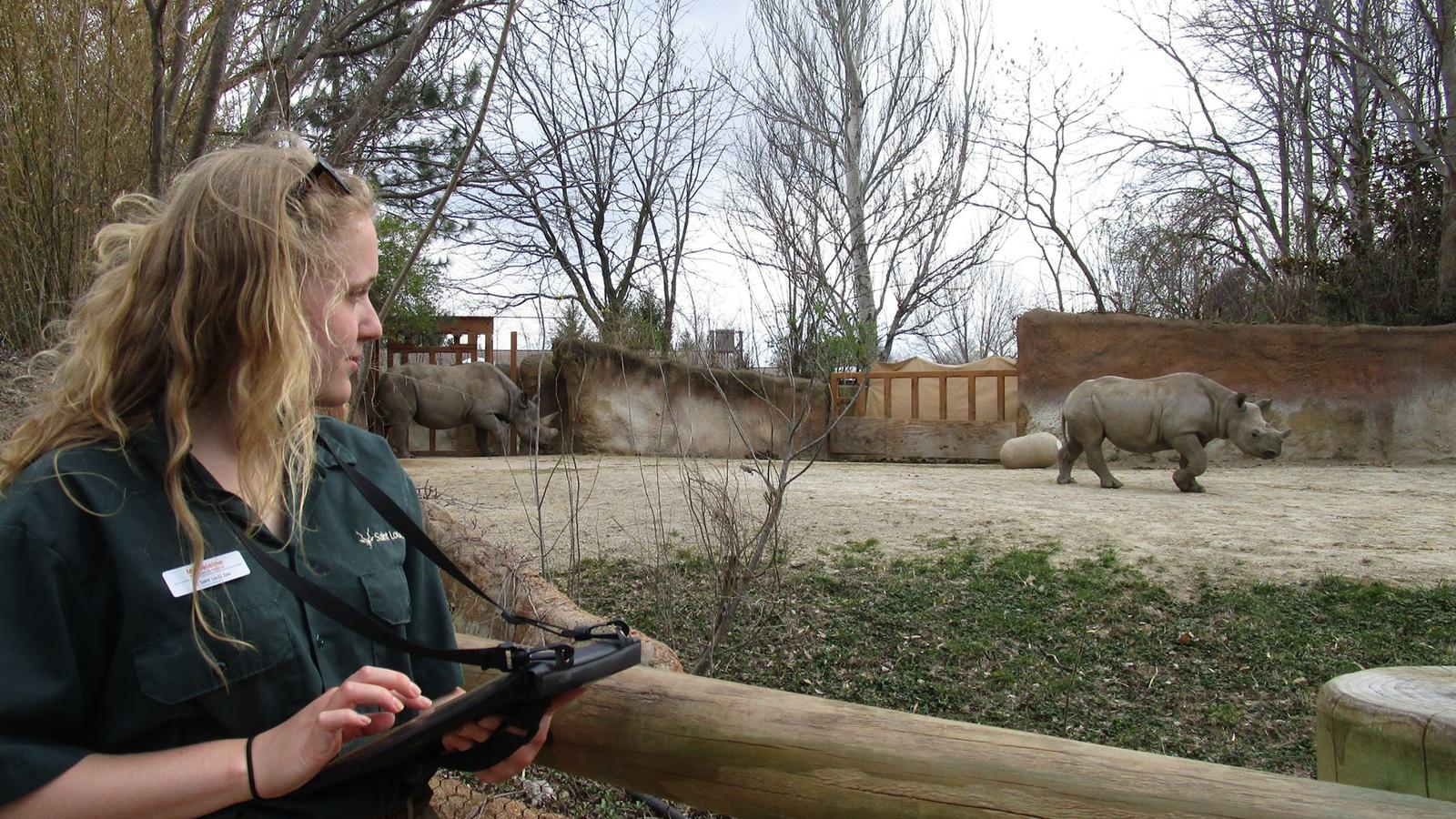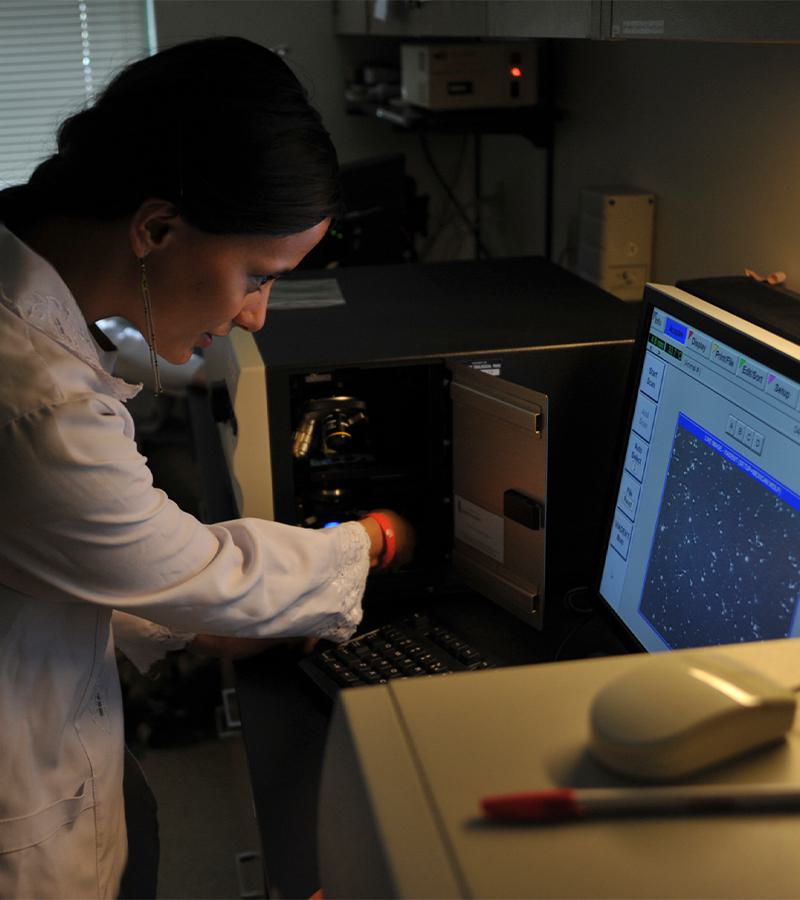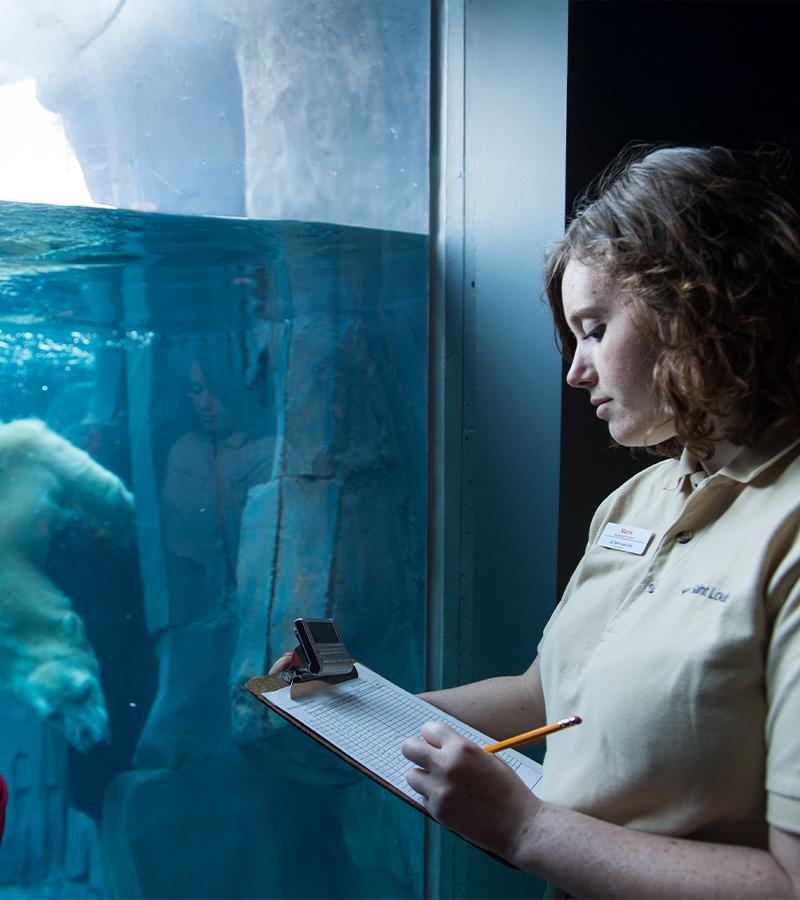
Research Internships

Who We Are
The Department of Reproductive and Behavioral Sciences offers research internships and independent study opportunities in three areas (Behavior and Animal Welfare, Endocrinology, and Reproductive Science) to upper-level college students, recent university graduates, and graduate and veterinary students.
Specific projects vary and it is important to note that most have no direct animal contact. Please see the information about each lab below. Due to the nature of our work, shadowing opportunities are not available.
Internships are typically one semester in length (summer, fall, and winter/spring). Internships longer than a semester in length are available by special arrangement, depending on the experience of the applicant and the needs of the department. You may apply to intern in more than one area.
Depending on the term, internship opportunities may be paid and/or unpaid. Paid and unpaid opportunities are lab-specific and vary by term. Students may be able to arrange to receive credit through their college or university (three hours per week in the lab is usually required for each credit hour, although university policies vary). Please note, there are different applications for paid versus unpaid internships; click the link associated with each type of opportunity below to apply.
Labs for Research Internships
Interns in the Endocrinology lab will be provided with training in techniques for noninvasive hormone monitoring, including processing serum, urine and fecal samples, fecal hormone extraction, EIA and RIA assay methodology, and preparation of reagents. Interns may participate in discussions of scientific literature and may be asked to perform literature searches, record keeping, and other duties as assigned. All interns will be given the necessary training in order to work safely with chemicals and radioactivity.
Applicants must have good attention to detail and be able to perform repetitive tasks in a laboratory setting. They must also be able to follow directions, work independently, and handle confidential information. Completion of undergraduate coursework in related field of study, including at least two laboratory-based courses, is required, along with a familiarity with Microsoft Office, especially Excel. Interns will have the opportunity to assist with several ongoing research projects. Applicants with prior experience in collaborative research projects, whether in class or independently in association with their college/university, will be prioritized.
Questions? Contact Corinne Kozlowski, Ph.D., Endocrinologist at Kozlowski@stlzoo.org.
The primary role of interns in Behavior and Animal Welfare is to collect behavioral data on a variety of species, either by performing live observations on Zoo grounds or by reviewing video footage. Behavior and Animal Welfare interns work on applied behavioral science research and contribute to studies of animal wellbeing, which includes measures of behavior alongside physiology and endocrinology, affective state, and health. Interns will be trained to use ZooMonitor and Noldus Observer XT for the collection of behavioral data.
In addition to collecting behavior data, interns will contribute to research efforts in Behavior and Animal Welfare through data summary and analysis, data mining, literature searches and reviews, and other tasks as needed. Interns will also participate in journal clubs to further broaden their exposure to how behavior and welfare are studied in zoo settings. Studies of behavior are observational and do not include animal contact. Coursework in animal behavior is recommended but not required. All interns must have excellent attention to detail and Excel skills are strongly recommended. Interns primarily work during regular business hours on weekdays and must be able to commit to at least 20 hours per week during summer or 10 hours per week during other terms. Interns will be co-supervised by the Manager of Behavioral Sciences and the Animal Welfare Scientist.
Questions? Contact Eli Baskir, M.S., Manager of Behavioral Sciences at Baskir@stlzoo.org or Ashley Edes, Ph.D., Animal Welfare Scientist at aedes@stlzoo.org
Work in reproductive science encompasses basic research on comparative reproductive systems as well as reproductive management, to enhance or control reproduction. Long-term reproductive management also includes cryopreservation of gametes and gonadal tissue from both males and females to extend the reproductive potential of animals into the future.
Interns in Reproductive Sciences will work with the Zoo’s Manager of Reproductive Sciences to collect, organize and analyze data from on-going projects focused on reproductive biology. Projects vary but may include post-thaw evaluations of semen using both standard microscopy and computer-assisted motion analysis (CASA), recording follicle measurements from ultrasound images, and analysis of reproductive behavior. All internships will include computer-based work, so knowledge of Excel and attention to detail is as important as lab or technical skills. Participation in reproductive success evaluations, which involve working with zoo staff to address challenges that may limit our ability to achieve population sustainability goals will be required; the intern will work on these independently and is expected to present at the end of the internship experience. Other expectations include participation in discussions of scientific literature, conducting literature searches, record keeping, giving educational tours, and other duties as assigned. Necessary training to work safely with lab chemicals and in animal areas will be provided. NOTE: This internship is largely focused on working with scientific data and lab-based experiences aimed at providing practical experience in reproductive sciences. Opportunities to assist with, or observe, animal procedures are possible, but not guaranteed to be part of this internship.
Interns must be able to follow directions, work both independently and as part of a team, and handle confidential information. Completion of coursework in related field of study, and some prior experience in collaborative research projects, whether in class or independently in association with their college/university is required. Those applicants with prior experience specific to reproductive physiology (lab or related animal experience) will be prioritized. Graduate students or veterinary students with an interest in comparative reproductive physiology are strongly preferred, but undergraduate upper classmen with the above background will also be considered, and are encouraged to apply.
Questions? Contact Karen Bauman, M.S., Manager, Reproductive Sciences at Kbauman@stlzoo.org.
Eligibility Requirements
- Minimum age requirement is 18.
- Applicants need not be currently enrolled in college/university, but prior college coursework is required.
- The general expectation is that internships are one semester long (minimum 10 weeks). Minimum hours per internship depend on the semester and the lab. Internships of other durations or time commitments can be discussed on a case-by-case basis with the respective lab supervisor.
- Any potential college credit must be discussed with and approved by the lab supervisor prior to the start of the internship. Prior to having this discussion, please be certain to have spoken with your university about what hours/credit are available (differs by university; our rule of thumb is 3hrs/credit) and what specifically will be required from the university to earn credit (e.g., just the experience, a report, etc.).
- Unpaid interns/externs can be employed on a part-time basis by the Zoo during their internship/externship; however, they cannot intern/extern and work in the same area.
- Some individuals completing an internship or externship in Reproductive Sciences will be asked to submit a negative TB test result by the start of their internship/externship.
- All successful candidates will be required to submit to a background check.
Deadlines
- Winter/Spring Semester: November 1 (These internships begin in January.)
- Summer: March 1 (These internships begin in late May or June.)
- Fall Semester: July 1 (These internships begin in late August or September.)
Paid Internship Opportunities
In addition to all the duties performed by unpaid interns (see lab descriptions above), paid interns are also required to complete a capstone presentation of their experience.
The Saint Louis Zoo is committed to playing a pivotal role in diversifying the future workforce of zoos and conservation organizations. The Saint Louis Zoo paid internship program is designed for emerging zoo professionals. Candidates who have financial need (those who otherwise would not be able to pursue an unpaid internship), reside in the Greater St. Louis bi-state metropolitan area, identify as Black, Native American, Asian, Pacific Islander, Arab, Middle Eastern, Hispanic, Latino/a/x, and/or those with diverse cultural experiences are encouraged to apply. All submitted applications will be considered.
At this time, paid internships will only be available for summer terms. Positions will be listed by January each year for the following summer. The application deadline for paid summer internships is March 1.
For summer 2025, two full-time paid internships (up to 400 hours each, one per lab/area) are available in:

Unpaid Internships
For summer 2025, no unpaid internships will be offered. Unpaid internships will be offered in fall 2025 and winter/spring 2026.

Paid Summer Internships for Washington University in St. Louis Undergraduate Students
During summer terms, we are happy to collaborate with Washington University in St. Louis to offer two full-time paid internships through the Living Earth Collaborative (LEC). During non-summer terms, Washington University students are encouraged to apply for unpaid internships if interested.
Deadline extended to April 1!
See internships/externships for opportunities in other Zoo departments.
Frequently Asked Questions
No housing is provided.
Unpaid interns/externs can be employed on a part-time basis by the Zoo during their internship/externship; however, they cannot intern/extern and work in the same area.
After the application deadline has passed, application materials will be reviewed by the lab supervisor(s) for the preferred labs listed on your application. Lab supervisors will reach out to qualified candidates to schedule a virtual interview or phone call. Processing time can take up to 8 weeks from the application deadline. All applicants will ultimately be notified of a decision.
The Department of Reproductive and Behavioral Sciences offers research internships and independent study opportunities in three areas: Behavior and Animal Welfare, Endocrinology, and Reproductive Science.
Interested in other internship opportunities at the Saint Louis Zoo?
See the internships/externships page for opportunities in other Zoo departments.
Questions?
Contact the supervisor for the lab(s) you are interested in.

